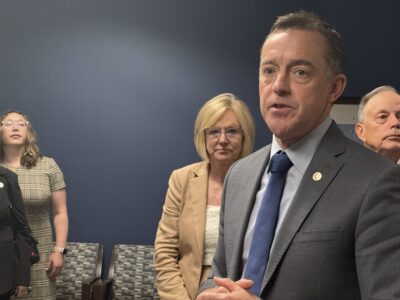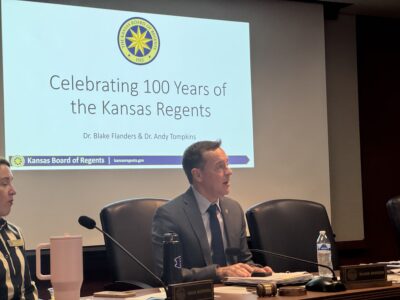Longtime national columnists talk about politics, anger and the upcoming presidential election at Dole Institute

photo by: Chad Lawhorn/Journal-World
Longtime Washington Post columnist and associate editor Karen Tumulty participated in a discussion about the changing nature of American politics on Oct. 17, 2024 at the Dole Institute of Politics in Lawrence.
In the 1992 presidential campaign, Bill Clinton’s chief strategist coined a phrase that’s been used to describe the driving issue of American politics for years since: “It’s the economy, stupid.”
While the economy is still a top-of-mind issue, it might be time to change the phrase. Now, it’s the anger, and if “stupid” is the meanest thing you’ve been called, it’s been a pretty tame day.
A pair of longtime national political columnists told a crowd at the Dole Institute of Politics on Thursday that anger is becoming a bigger and bigger driving force in American politics.
“We are in the age of disillusionment … Donald Trump arrived and turned disillusionment into anger,” Jerry Seib, the former executive Washington editor for The Wall Street Journal, said as part of a Dole Institute event dubbed “The Growing Divide: Political Realignment in the Modern Era.”
Karen Tumulty, a columnist and associate editor for The Washington Post, told the crowd that many Americans are misunderstanding the anger, the criminality, and the divisiveness of Trump. Many Trump opponents are bewildered how so many Trump supporters can overlook those character flaws.
But, Tumulty said, they aren’t overlooking them at all.
“There are people who like that,” Tumulty said. “What most people would call character flaws, there are people energized by the things he says. What we are seeing in the final weeks of the campaign, he is just doubling down on being as divisive as he possible can.
“That’s what I don’t understand … there are people who are enthused by it, and who just love it.”
Both Seib and Tumulty gave Trump credit for recognizing a mood in America much earlier than many others. Tumulty noted that Trump filed an application with the U.S. trademark office to register the phrase “Make America Great Again” just six days after Mitt Romney lost to Barack Obama in the 2012 presidential election.
But the beginnings of the the country’s era of disillusionment likely go back a few years earlier. Tumulty told the crowd of a conversation she had with former U.S. Speaker of the House Nancy Pelosi after Democrats lost their majority in the House following the 2010 elections. Tumulty assumed that Pelosi would blame the loss on voter disenchantment about the national health care debate.
Instead, Pelosi said voters were more upset about how the Democrats responded to the financial crisis of 2008. Wall Street and big corporations got bailed out, but many ordinary Americans faced financial ruin.
Seib said you could add a couple of other items to the list of topics that have ignited the era of disillusionment.
“I think people have legitimate reasons to be disillusioned with government,” Seib said. “You have a government in Washington that has failed to deal with the immigration problem. It has failed to deal with a deficit that has exploded in the last 20 years and nobody seems to care about it. And as Karen said, there was a financial crisis in 2008, and the Wall Street guys got bailed out and you lost your house. That doesn’t go over particularly well. And you have had two essentially failed wars — one in Iraq and one in Afghanistan.
“I think people look at that and say, it is not working for me.”
What it all will mean for this upcoming presidential election is, well, anyone’s guess. Neither Seib nor Tumulty offered a prediction, and both said it was an impossible race to predict.
“In the end, it is going to be decided in seven states and probably by fewer than 70,000 voters,” Tumulty said. “I mean, that is not even that big of a college football stadium.”
What the pair was more comfortable predicting is that government is highly likely to be divided. There’s a real possibility that Republicans may take control of the Senate, while Democrats take control of the House. Such a double flip has never occurred in American history, Tumulty said.
That would mean the new president — either Harris or Trump — would not have a clear path for legislative victories in Congress.
“So, governing is going to be difficult,” Seib said. “That is the one thing we can predict with certainty here tonight.”

photo by: Chad Lawhorn/Journal-World
Longtime political journalists Jerry Seib and Karen Tumulty participated in a Dole Institute event on the growing divide in American politics on Oct. 17, 2024.







